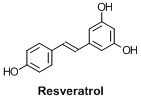What is resveratrol?
This article will attempt to answer the question "What is resveratrol" from a bottom-up approach. First, we'll talk about the basic resveratrol structure and where it comes from. From there, we will move up the complexity ladder to what resveratrol does to cells and why it has generated so much excitement in the community. Finally, we will tell you what is going on right now in resveratrol clinical research.
What is resveratrol: Structure
Resveratrol is a stilbene-derived phenolic antioxidant. Stilbene refers to the shape of the carbon skeleton that resveratrol is based on. Resveratrol is a phenolic antioxidant, like quercetin or green tea's EGCG because it has an "OH" group that can quench free radicals.
 Resveratrol is found in numerous dietrary sources, but most commonly in grapes. Known as a phytoalexin, resveratrol levels increase as a result of stress on the grapes like UV light, cold temperatures or heavy metal contaminants (1). Part of the medicinal appeal of resveratrol resides in this protective role as a stress-response agent. The thinking goes like this: faced with cold temperatures or extreme UV light, grapes will increase the resveratrol antioxidant content to protect themselves. The next logical step is that humans will also receive stress-reduction benefits from this compound. The reality is much more complex.
Resveratrol is found in numerous dietrary sources, but most commonly in grapes. Known as a phytoalexin, resveratrol levels increase as a result of stress on the grapes like UV light, cold temperatures or heavy metal contaminants (1). Part of the medicinal appeal of resveratrol resides in this protective role as a stress-response agent. The thinking goes like this: faced with cold temperatures or extreme UV light, grapes will increase the resveratrol antioxidant content to protect themselves. The next logical step is that humans will also receive stress-reduction benefits from this compound. The reality is much more complex.
What is resveratrol: What it does
Resveratrol is known to activate a wide range of cellular pathways, both in cell culture and in animals (2,3). The results are far to wide-ranging to summarize here, but most researchers contend that resveratrol impacts genes associated with cellular stress and metabolism. A popular theory holds that resveratrol exerts it's effects by activating a protein called sirtuin. Since sirtuin is believed to act as a sensor for low cellular energy levels, sirtuin activation mimics the life-prolonging effects of calorie restriction (LINK) (4).
What is resveratrol: The French Paradox?
Doctors have puzzled for years over how the French manage to avoid heart disease in spite of high-fat diets (5). While wine took center stage in the debate early on, resveratrol as a possible molecular basis for this action was suggested more recently (6). Given the range of effects resveratrol has been measured to have on cells, any number of resveratrol-centric explanations for this curious phenomenon is possible (2). But clinical evidence for the efficacy of resveratrol is very much in process.
What is resveratrol: Drug or supplement?
Interesting question. Currently, Sirtris Pharmaceuticals (LINK) is taking a new form of resveratrol into the clinic for a variety of age-related indications like cancer, diabetes and probably Alzheimer's disease. These studies are deeply needed in light of all the hype, but the jury is definitely out on resveratrol's clinical efficacy.
Resveratrol supplements, meanwhile, are being promoted all over the internet as a miracle anti-aging cure. After looking over the scientific literature with a critical eye, I think these claims out to be considerably more controversial than they are.
![]()
References:
1. Cantos, E, Garcia-Viguera, C, de Pascual-Teresa, S, Tomas-Barberan, FA. "Effect if postharvest ultraviolet irradiation on resveratrol and other phenolics of cv. Napoleon table grapes." J Agric Food Chem 48 (2000) 4606-12.
2. Shakibaei, M, Harikumar, KB, Aggarwal, BB. "Resveratrol addiction: To die or not to die." Mol Nutr Food Res 53 (2009) 115-28.
3. Baur, JA, Sinclair, DA. "Therapeutic potential of resveratrol: the in vivo evidence." Nature Reviews: Drug Discovery. 5 (2006) 493-506.
4. Chaudhary, N, Pfluger, PT. "Metabolic benefits from Sirt1 and Sirt1 activators." Curr Opin Clin Nutr Metab Care. 12 (2009) 431-7.
5. Renaud, S, de Lorgeril, M. "Wine, alcohol, platelets, and the French paradox for coronary heart disease." Lancet 339 (1992) 1523-26.
6. Kopp, P. "Resveratrol, a phytoestrogen found in red wine. A possible explanation for the conundrum of the 'French Paradox'?" Eur J Endocrin 138 (1998) 619-20.


